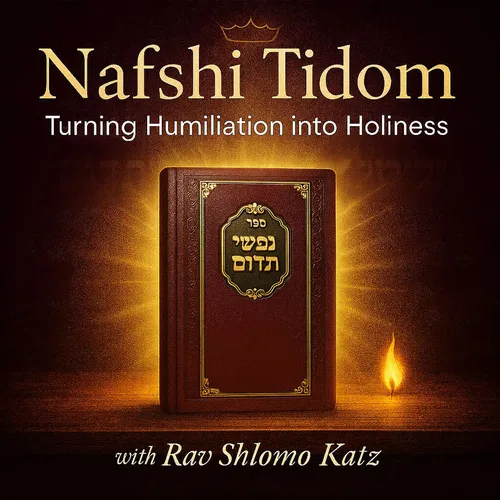
Nafshi Tidom: Turning Humiliation into Holiness with Rav Shlomo Katz
"Nafshi Tidom" — drawn from the words we say in Elokai Netzor:
“למקללי נפשי תדום” – “To those who curse me, may my soul be silent.”
In this 5-part series, Rav Shlomo Katz explores one of the deepest Breslov teachings: how to face humiliation (bizyonot) not with anger or revenge, but with silence, emunah, and inner strength.
Drawing from Rabbi Lazer Brody’s sefer Nafshi Tidom, classic sources in Chazal, Chassidus, and the writings of Rabbi Nachman of Breslov, Rav Shlomo guides us through:
- Why humiliation comes our way,
- How it serves as a tool for tikkun hamiddot (refinement of character),
- The inner work of silence and acceptance,
- And how our ancestors — from Avraham Avinu to David HaMelech — grew through disgrace.
This is a series about courage, humility, and discovering Hashem’s closeness precisely in moments of shame.
- Update frequency
- every day
- Average duration
- 16 minutes
- Episodes
- 5
- Years Active
- 2025

5. The Fathers, David HaMelech, and the Secret of Greatness
From Avraham Avinu to David HaMelech, our greatest leaders endured profound humiliation. Rav Shlomo Katz weaves teachings from Rabbi Levi Yitzchak of Berditchev and the Baal HaTanya, explaining how b…

4. 6 Pathways: Between Man and Fellow
Humiliation also arises from how we treat others. Rav Shlomo presents six bein adam lechavero causes of bizyonot: embarrassing others, mocking tzaddikim, flattery, scoffing, and more. With stories fr…

3. 14 Pathways: Between Man and God
Rav Shlomo outlines 14 possible reasons bizyonot come to us in the realm of bein adam laMakom — from neglect in Torah and mitzvot, to arrogance, sadness, or blemishing kavod HaTorah. Each humiliation…

2. Why Did This Happen to Me? Turning Suffering into Growth
Exploring the response to humiliation: do we ask “Why me?” in complaint, or “Why me?” as inner work? Rav Shlomo Katz unpacks lessons from Yosef’s brothers, Rabbeinu Bechaye, and the Piasetzna Rebbe, …

1. Defining Bizayon: What Counts as Humiliation?
Rav Shlomo Katz introduces Nafshi Tidom, a sefer by Rav Lazer Brody dedicated to understanding bizyonot — insults, disgrace, and humiliation. Drawing from Gemara, Chassidic sources, and halacha, he d…